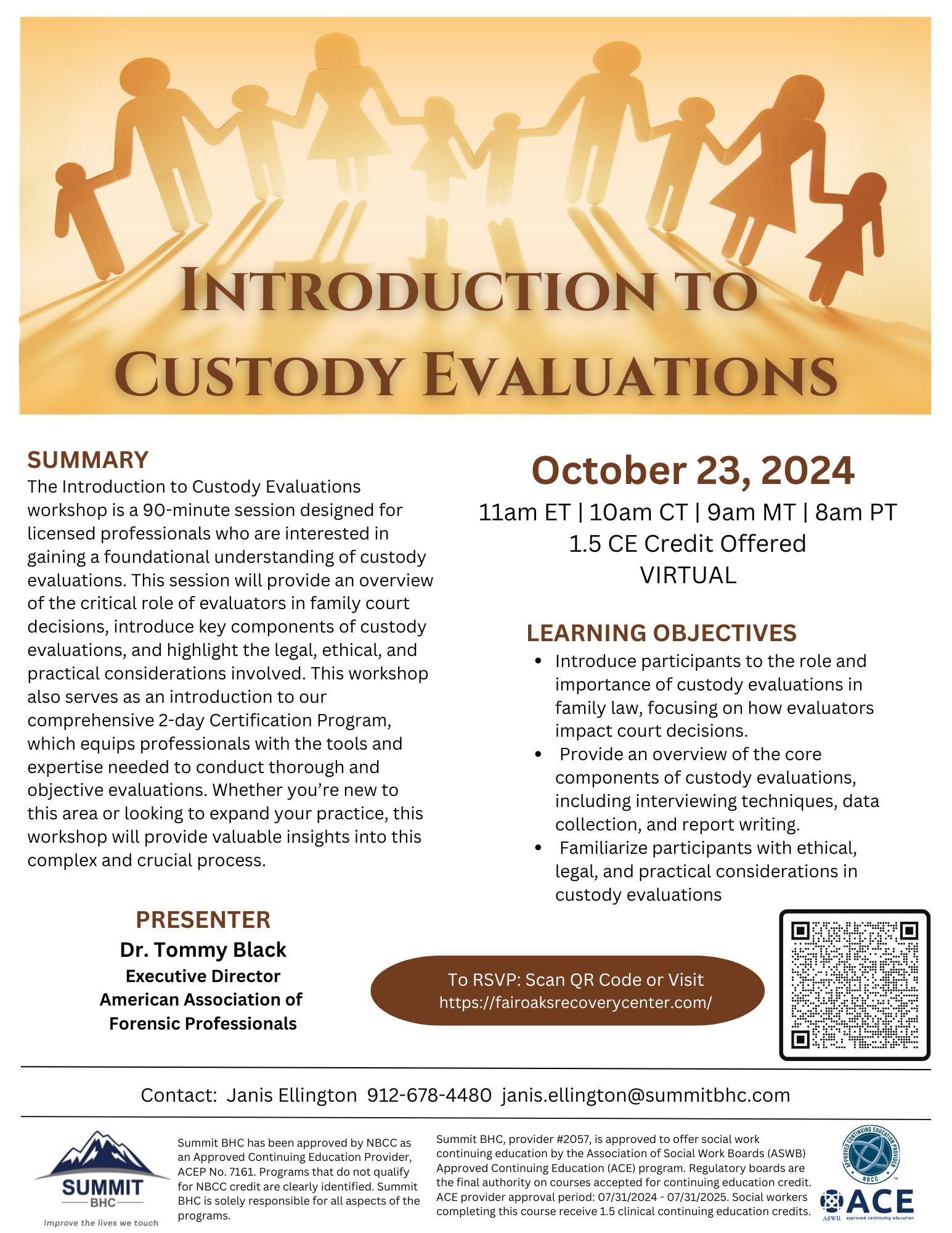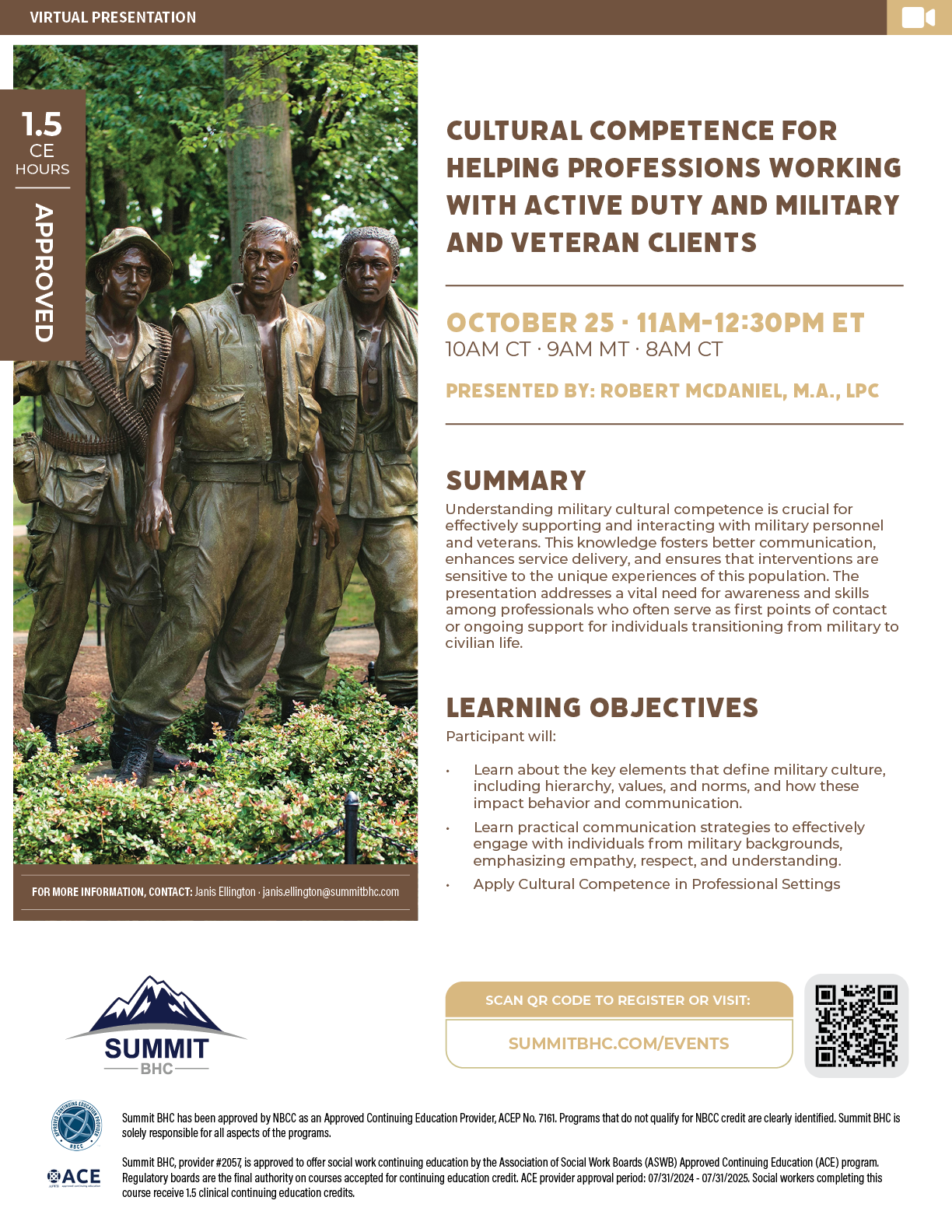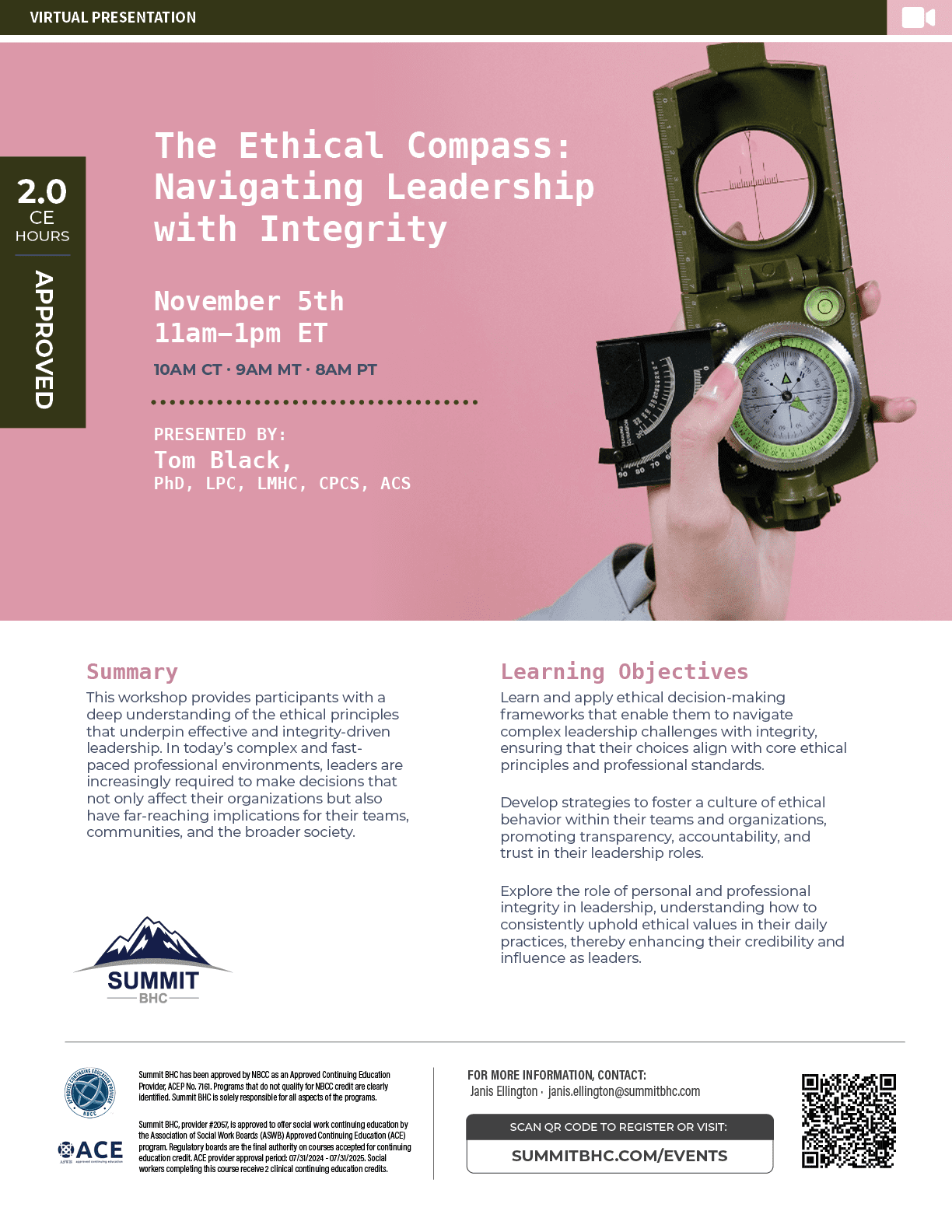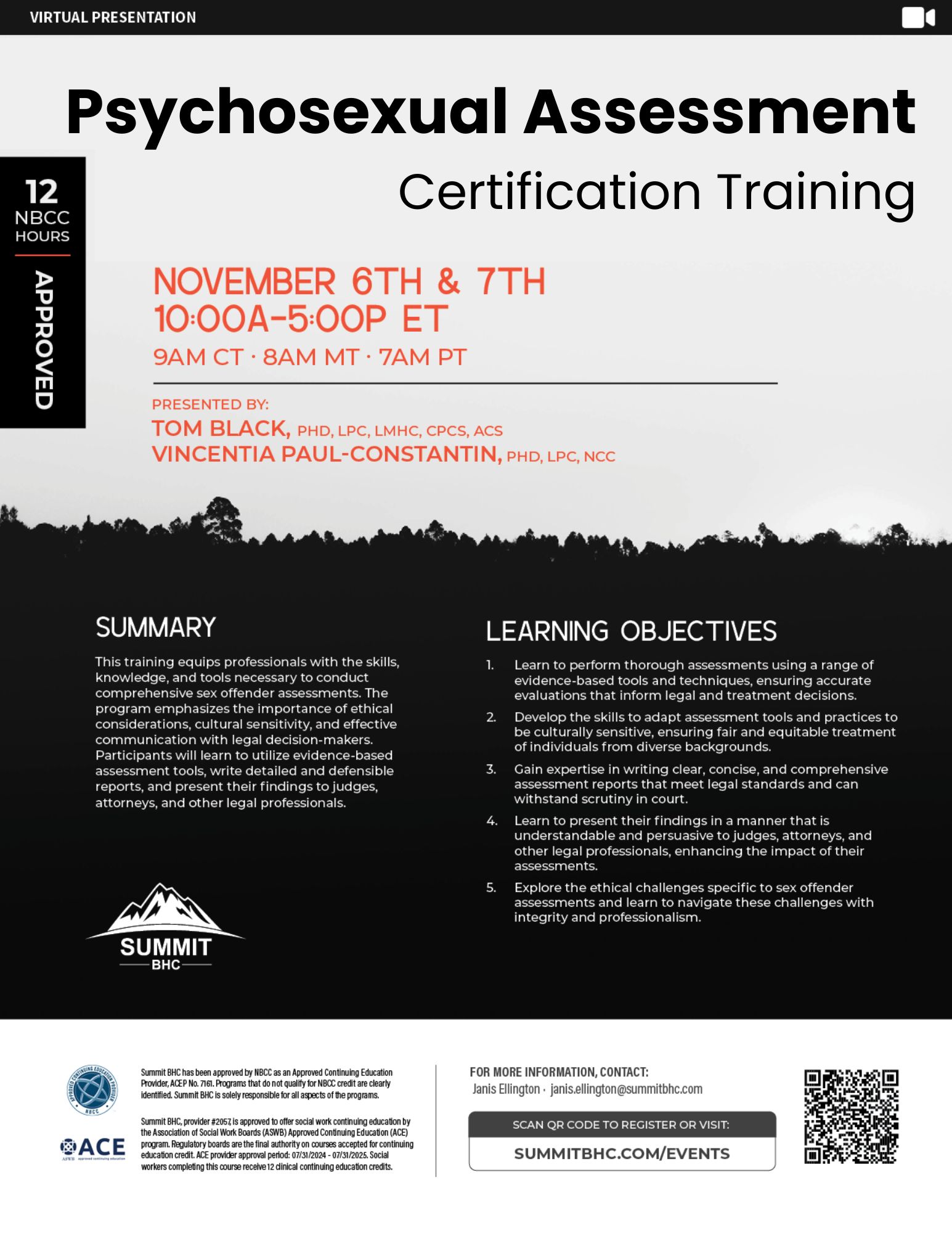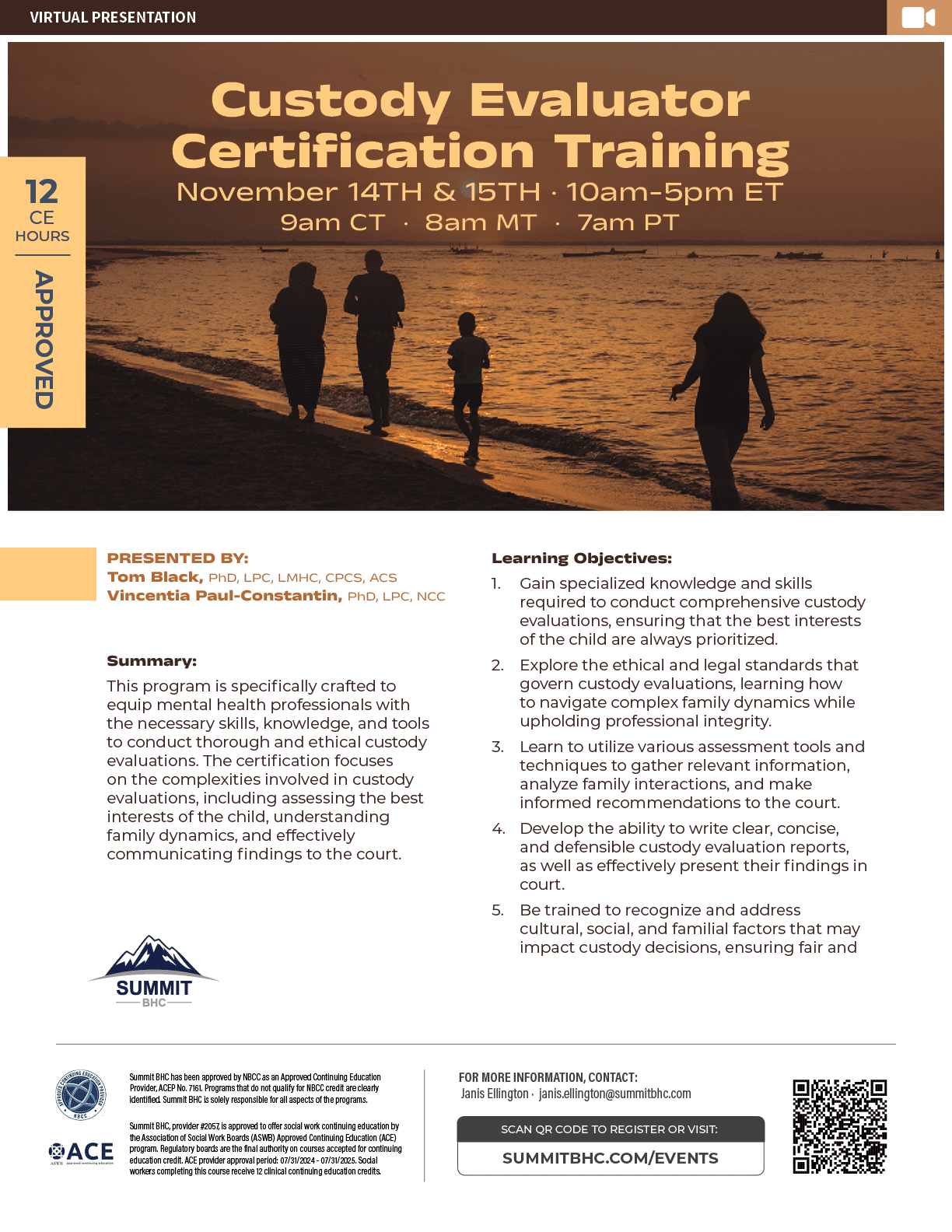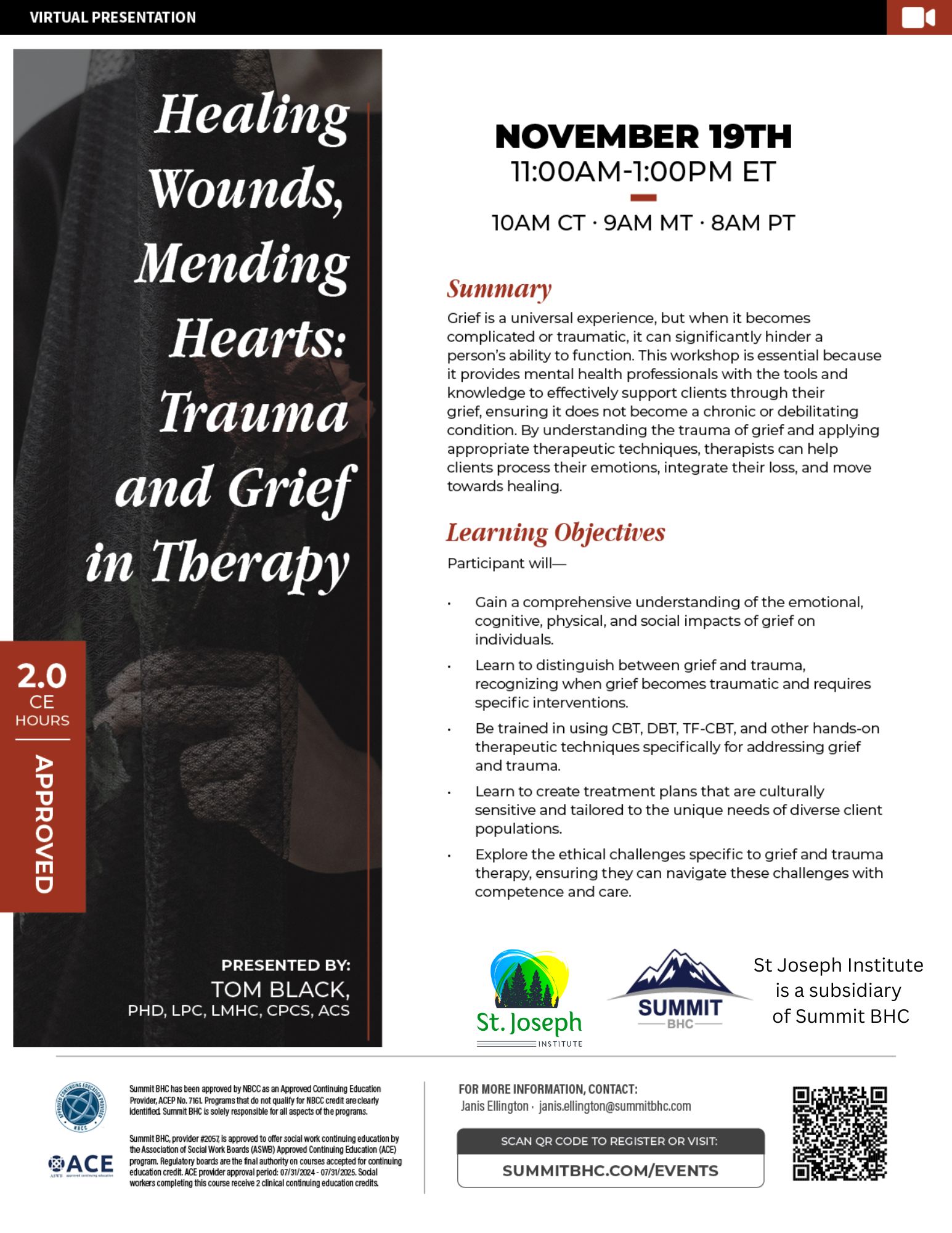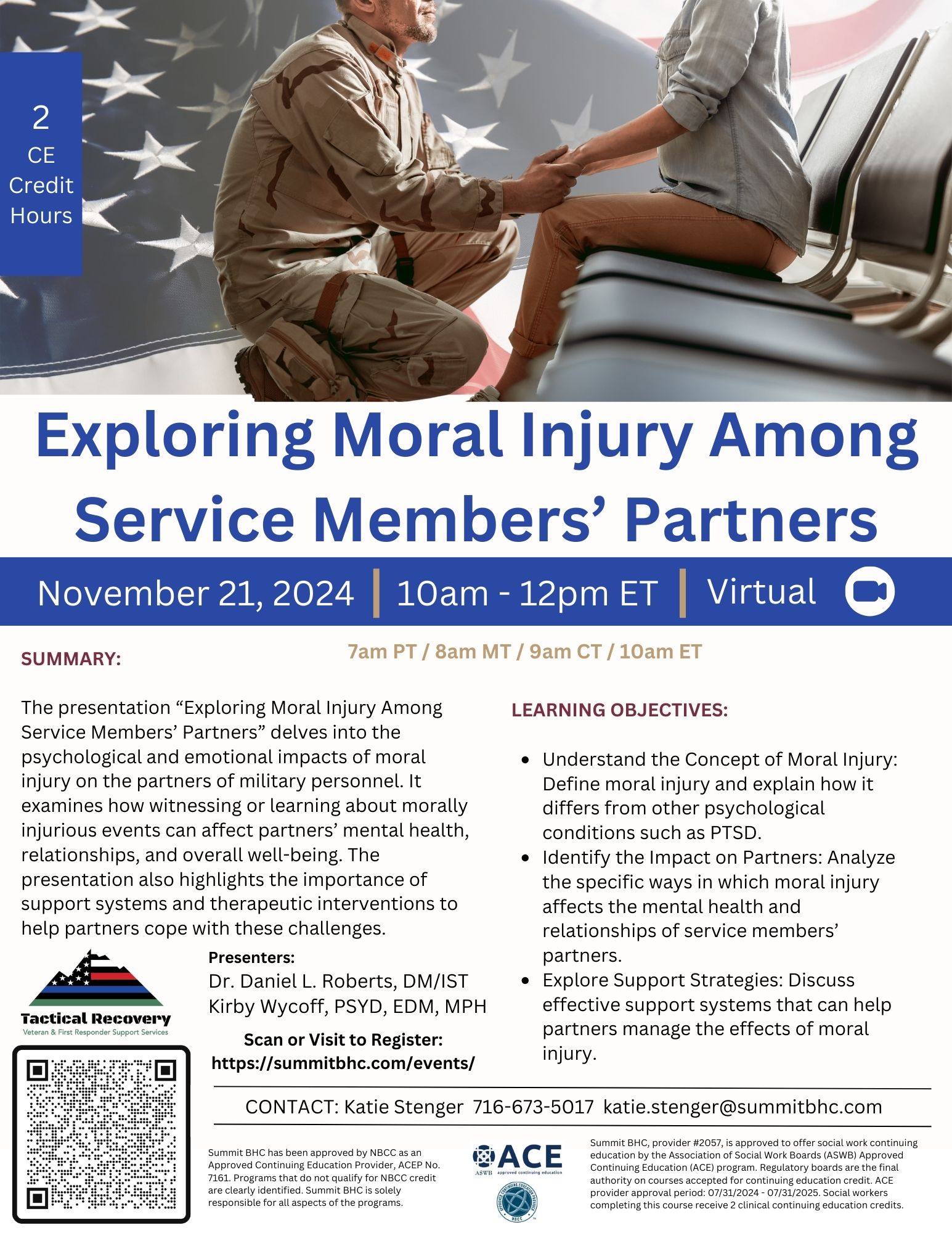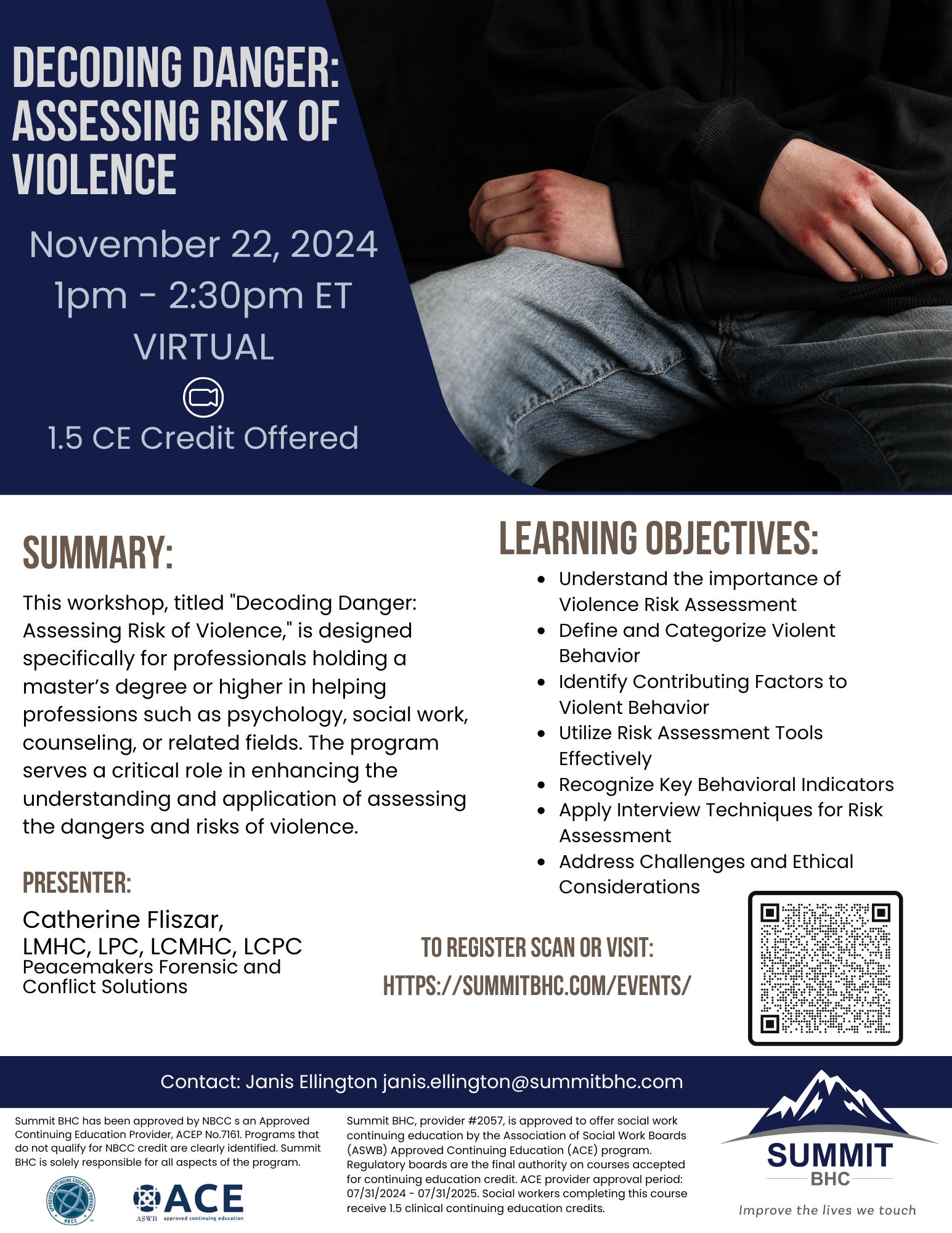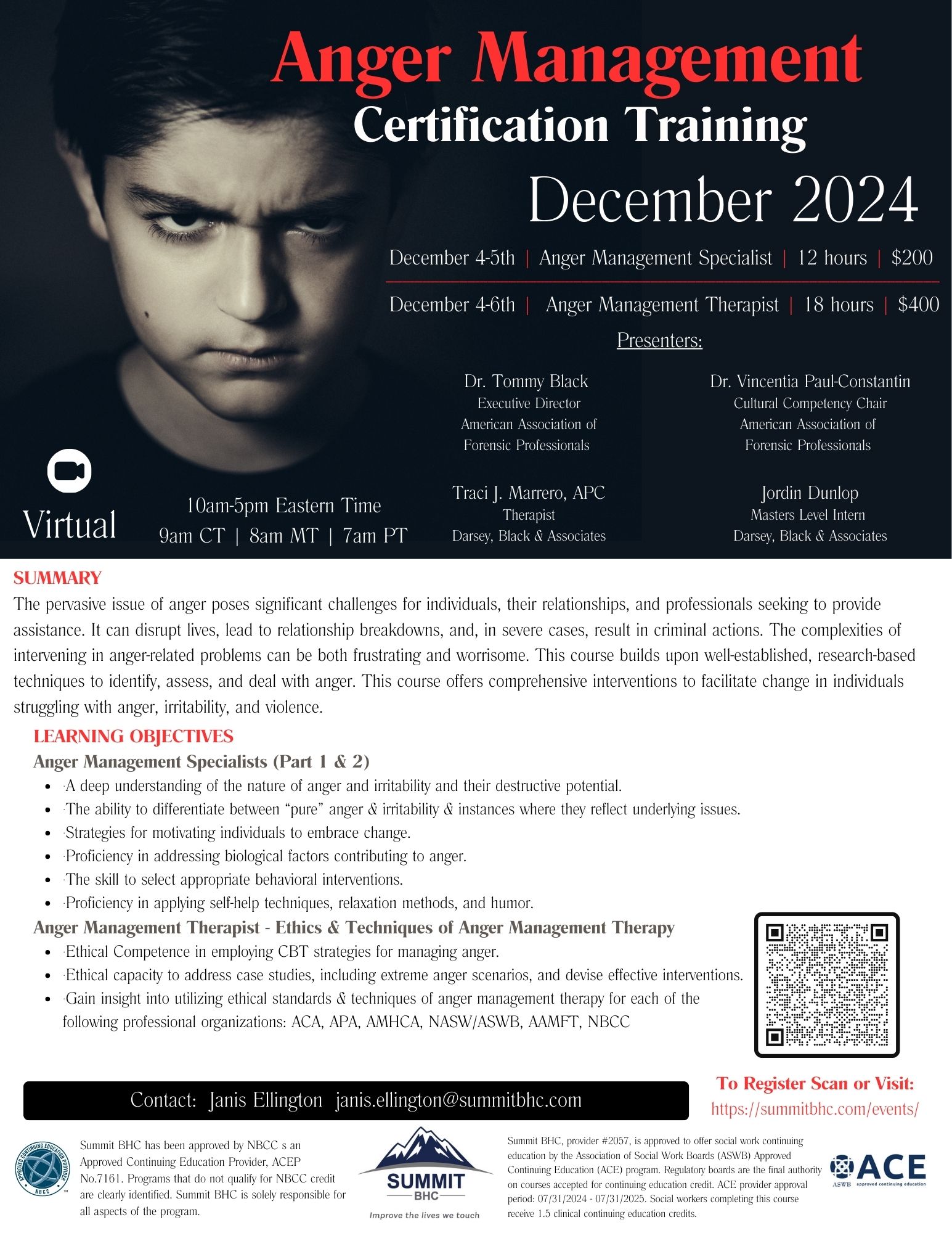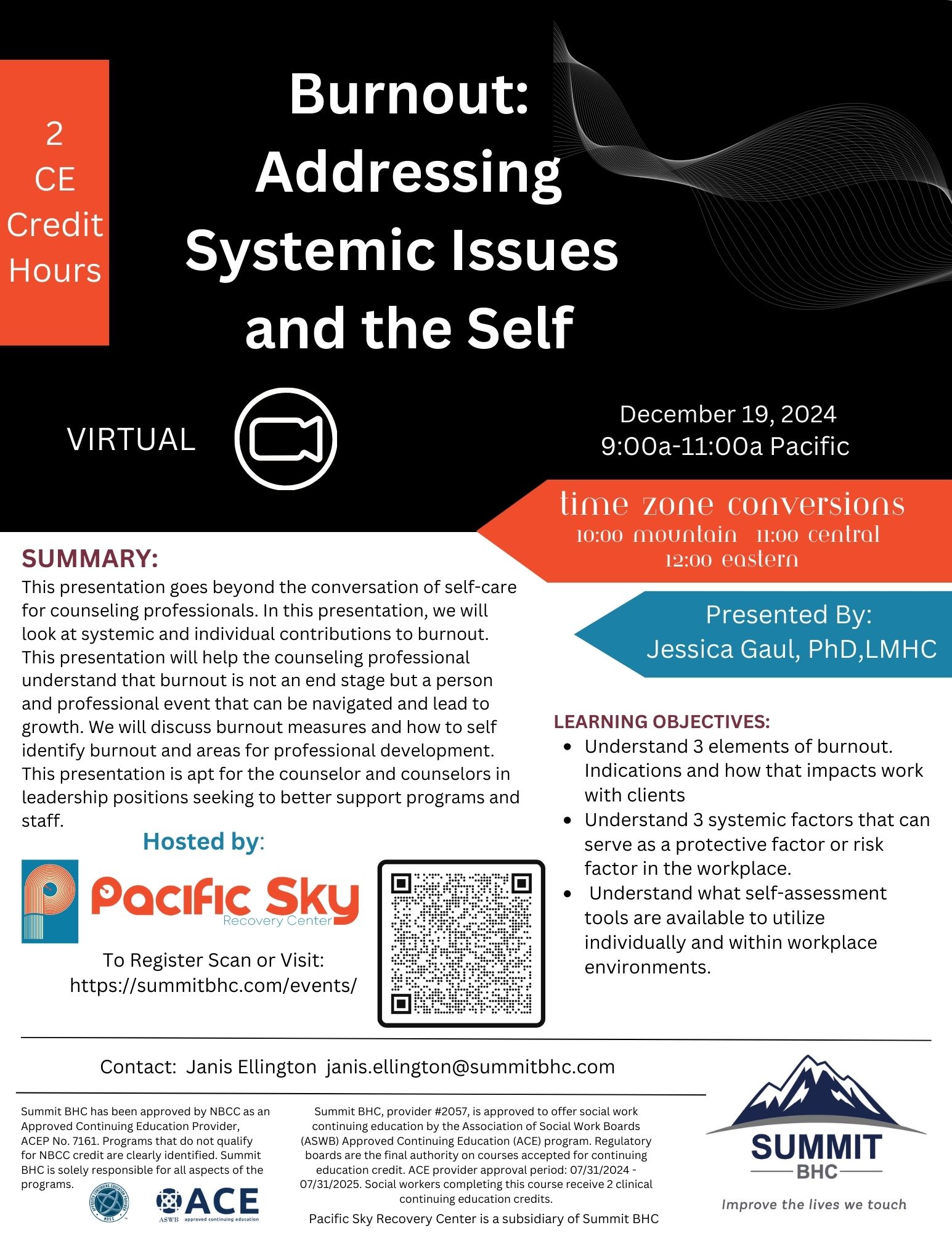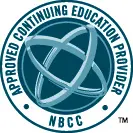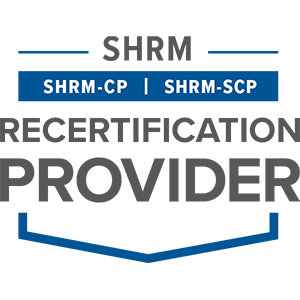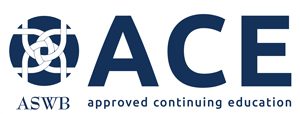Events
Networking & Educational Events Hosted by Summit BHC
Summit BHC hosts a number of networking and educational events for our colleagues throughout the year. Please register if you are interested in attending.
For questions regarding Summit BHC sponsored events, please reach out to Janis Ellington, Director of Education & Event Strategies, at 912-678-4480 or jellington@summitbhc.com.
If you would like to be notified of upcoming events and educational opportunities offered at Summit BHC affiliated facilities, please click the link below to join our email list.
We will never share your contact information with anyone. Please see our Privacy Policy for more details.
Introduction to Custody Evaluations
Summary:
The Introduction to Custody Evaluations workshop is a 90-minute session designed for licensed professionals who are interested in gaining a foundational understanding of custody evaluations. This session will provide an overview of the critical role of evaluators in family court decisions, introduce key components of custody evaluations, and highlight the legal, ethical, and practical considerations involved. This workshop also serves as an introduction to our comprehensive 2-day Certification Program, which equips professionals with the tools and expertise needed to conduct thorough and objective evaluations. Whether you’re new to this area or looking to expand your practice, this workshop will provide valuable insights into this complex and crucial process.
Learning Objectives:
- Introduce participants to the role and importance of custody evaluations in family law, focusing on how evaluators impact court decisions.
- Provide an overview of the core components of custody evaluations, including interviewing techniques, data collection, and report writing.
- Familiarize participants with ethical, legal, and practical considerations in custody evaluations
For more information contact:
Name: Janis Ellington
Phone: 912-678-4480
Email: janis.ellington@summitbhc.com
Cultural competence for helping professions working with active duty and military and veteran clients
Summary:
Understanding military cultural competence is crucial for effectively supporting and interacting with military personnel and veterans. This knowledge fosters better communication, enhances service delivery, and ensures that interventions are sensitive to the unique experiences of this population. The presentation addresses a vital need for awareness and skills among professionals who often serve as first points of contact or ongoing support for individuals transitioning from military to civilian life.
Learning Objectives:
- Learn about the key elements that define military culture, including hierarchy, values, and norms, and how these impact behavior and communication.
- Learn practical communication strategies to effectively engage with individuals from military backgrounds, emphasizing empathy, respect, and understanding.
- Apply Cultural Competence in Professional Settings
For more information contact:
Name: Janis Ellington
Email: janis.ellington@summitbhc.com
The Ethical Compass: Navigating Leadership with Integrity
Summary:
Summary:
This workshop provides participants with a deep understanding of the ethical principles that underpin effective and integrity-driven leadership. In today’s complex and fast-paced professional environments, leaders are increasingly required to make decisions that not only affect their organizations but also have far-reaching implications for their teams, communities, and the broader society.
Agenda:
10:00 am – Welcome / Housekeeping Announcements / Introduction of Speaker
10:00am-11:20am – Objectives 1-4
11:20am – Q&A
11:30 – Evaluations / Sign Out
Learning Objectives:
- Learn and apply ethical decision-making frameworks that enable them to navigate complex leadership challenges with integrity, ensuring that their choices align with core ethical principles and professional standards
- Develop strategies to foster a culture of ethical behavior within their teams and organizations, promoting transparency, accountability, and trust in their leadership roles.
- Explore the role of personal and professional integrity in leadership, understanding how to consistently uphold ethical values in their daily practices, thereby enhancing their credibility and influence as leaders.
For more information contact:
Name: Janis Ellington
Email: janis.ellington@summitbhc.com
Psychosexual Assessments
Summary:
Summary:
This training equips professionals with the skills, knowledge, and tools necessary to conduct comprehensive sex offender assessments. The program emphasizes the importance of ethical considerations, cultural sensitivity, and effective communication with legal decision-makers. Participants will learn to utilize evidence-based assessment tools, write detailed and defensible reports, and present their findings to judges, attorneys, and other legal professionals.
Learning Objectives:
- Learn to perform thorough assessments using a range of evidence-based tools and techniques, ensuring accurate evaluations that inform legal and treatment decisions.
- Develop the skills to adapt assessment tools and practices to be culturally sensitive, ensuring fair and equitable treatment of individuals from diverse backgrounds.
- Gain expertise in writing clear, concise, and comprehensive assessment reports that meet legal standards and can withstand scrutiny in court.
- Learn to present their findings in a manner that is understandable and persuasive to judges, attorneys, and other legal professionals, enhancing the impact of their assessments.
- Explore the ethical challenges specific to sex offender assessments and learn to navigate these challenges with integrity and professionalism.
For more information contact:
Name: Janis Ellington
Phone: 912-678-4480
Email: janis.ellington@summitbhc.com
Custody Evaluator Certification Training
Summary:
Summary:
This program is specifically crafted to equip mental health professionals with the necessary skills, knowledge, and tools to conduct thorough and ethical custody evaluations. The certification focuses on the complexities involved In custody evaluations, including assessing the best interests of the child, understanding family dynamics, and effectively communicating findings to the court.
Learning Objectives:
- Gain specialized knowledge and skills required to conduct comprehensive custody evaluations, ensuring that the best interests of the child are always prioritized.
- Explore the ethical and legal standards that govern custody evaluations, learning how to navigate complex family dynamics while upholding professional Integrity.
- Learn to utilize various assessment tools and techniques to gather relevant information, analyze family interactions, and make informed recommendations to the court.
- Develop the ability to write clear, concise, and defensible custody evaluation reports, as well as effectively present their findings in court.
- Be trained to recognize and address cultural, social, and familial factors that may impact custody decisions, ensuring fair and
For more information contact:
Name: Janis Ellington
Phone: 912-678-4480
Email: janis.ellington@summitbhc.com
Healing Wounds, Mending Hearts: Trauma and Grief in Therapy
Summary:
Summary:
Grief is a universal experience, but when it becomes complicated or traumatic, it can significantly hinder a person’s ability to function. This workshop is essential because it provides mental health professionals with the tools and knowledge to effectively support clients through their grief, ensuring it does not become a chronic or debilitating condition. By understanding the trauma of grief and applying appropriate therapeutic techniques, therapists can help clients process their emotions, integrate their loss, and move towards healing.
Learning Objectives:
- Gain a comprehensive understanding of the emotional, cognitive, physical, and social impacts of grief on individuals.
- Learn to distinguish between grief and trauma, recognizing when grief becomes traumatic and requires specific intentions.
- Be trained in using CBT, DBT, TF-CBT, and other hands-on therapeutic techniques specifically for addressing grief and trauma.
- Learn to create treatment plans that are culturally sensitive and tailored to the unique needs of diverse client populations.
- Explore the ethical challenges specific to grief and trauma therapy, ensuring they can navigate these challenges with competence and care.
For more information contact:
Name: Janis Ellington
Email: janis.ellington@summitbhc.com
Exploring Moral Injury Among Service Members’ Partners
Summary:
The presentation “Exploring Moral Injury Among Service Members’ Partners” delves into the psychological and emotional impacts of moral injury on the partners of military personnel. It examines how witnessing or learning about morally injurious events can affect partners’ mental health, relationships, and overall well-being. The presentation also highlights the importance of support systems and therapeutic interventions to help partners cope with these challenges.
Learning Objectives:
- Understand the Concept of Moral Injury: Define moral injury and explain how it differs from other psychological conditions such as PTSD.
- Identify the Impact on Partners: Analyze the specific ways in which moral injury affects the mental health and relationships of service members’ partners.
- Explore Support Strategies: Discuss effective support systems that can help partners manage the effects of moral injury.
For more information contact:
Name: Katie Stenger
Phone: 716-673-5017
Email: katie.stenger@summitbhc.com
Decoding Danger: Assessing Risk of Violence
Summary:
This workshop, titled “Decoding Danger: Assessing Risk of Violence,” is designed specifically for professionals holding a Master’s degree or higher in helping professions such as psychology, social work, counseling, or related fields. The program serves a critical role in enhancing the understanding and application of assessing the dangers and risks of violence.
Learning Objectives:
- Understanding the importance of Violence Risk Assessment
- Define and Categorize Violent Behavior
- Identify Contributing Factors to Violent Behavior
- Utilize Risk Assessment Tools Effectively
- Recognize Key Behavioral Indicators
- Apply Interview Techniques for Risk Assessment
- Address Challenges and Ethical Considerations
For more information contact:
Name: Janis Ellington
Email: janis.ellington@summitbhc.com
Anger Management Certification Training
Summary:
Summary:
The American Association of Forensic Professionals, Inc., is proud to introduce an innovative Anger Management Certification Program designed specifically for mental health professionals. This cutting-edge program is meticulously crafted to address the pervasive challenges posed by anger, which can severely disrupt lives, deteriorate relationships, and in extreme cases, lead to criminal activities. The complexities associated with managing anger-related issues necessitate a comprehensive approach that not only addresses the symptoms but also the underlying causes of anger, irritability, and violence.
This 12 to 18-hour course is based on well-established, research-based techniques aimed at identifying, assessing, and effectively managing anger. It covers a wide array of interventions and strategies, from motivation enhancement and addressing biological contributors to employing cognitive-behavioral therapy (CBT) and relaxation techniques. This program is unique in its comprehensive approach, incorporating the exploration of anger’s nature, its effects on individuals and their relationships, and systemic factors that perpetuate anger.
Participants will delve into various aspects of anger management, including understanding and addressing denial, enhancing insight and empathy, and exploring the impact of identity and occupation on anger. The program also emphasizes the importance of addressing extreme anger and the use of humor as a tool for managing anger, all while being aware of its potential pitfalls.
Learning Objectives:
- A deep understanding of the nature of anger and irritability and their destructive potential.
- The ability lo differentiate between 'pure" anger & irritability & instances where they reflect underlying issues.
- Strategies for motivating individuals to embrace change.
- Proficiency in addressing biological factors contributing to anger.
- The skill to select appropriate behavioral interventions.
- Ethical Competence in employing CBT strategies for managing anger.
- Ethical capacity to address case studies, including extreme anger scenarios, and devise effective interventions.
- Gain insight into utilizing ethical standard & techniques of anger management therapy for each of the following professional organizations: ACA, APA, AMHCA NASW/AS\1/B, AAJ\I\FT, BCC
For more information contact:
Name: Janis Ellington
Email: janis.ellington@summitbhc.com
Burnout: Addressing Systemic Issues and the Self
Summary:
This presentation goes beyond the conversation of self-care for counseling professionals. In this presentation, we will look at systemic and individual contributions to burnout. This presentation will help the counseling professional understand that burnout is not an end stage but a person and professional event that can be navigated and lead to growth. We will discuss burnout measures and how to self identify burnout and areas for professional development. This presentation is apt for the counselor and counselors in leadership positions seeking to better support programs and staff.
For more information contact:
Name: Janis Ellington
Email: janis.ellington@summitbhc.com

